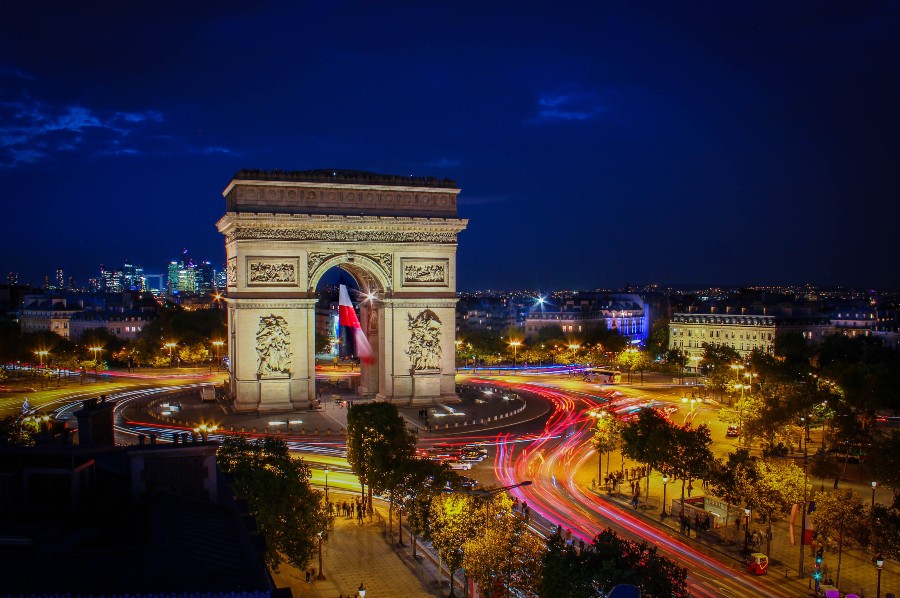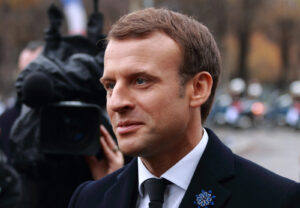Emanuel macron is an enigma. If his meteoric rise from relative anonymity to one of the most viable candidates for the French presidency in 2017 was surprising, his eventual win was nothing short of a miracle. Like Donald Trump’s win the previous year, it showed a deep mistrust in both countries’ populace for the current political establishment and a strong urge to look for answers outside traditional options. But that’s where the similarities end. While Trump’s presidency was marked with increasingly more bizarre decisions and debacles, Macron has emerged as an influential leader in global platforms you may love or hate but definitely cannot dismiss.
Career diplomat Alain Lefebvre does a deft job of pushing through some of that enigma in his new book Macron Unveiled: The Prototype for a New Generation of World Leaders, published by Gaudiam. Lefebvre situates Macron at once within and in contrast to the political culture of France— fiercely nationalistic and with a proclivity for romantic idealism. A lot of Macron’s core qualities are a marked departure from what the classical idea of a French politician. And yet they carry the legacy of ideas and personalities that come long before him.
Like Macron, the writer’s strongest suit is diplomacy and foreign policy, and that’s where the book shines the brightest. Lefebvre’s crisp prose, peppered with contemporary and historical anecdotes, situates Macron as a savvy politician on the global stage, with a penchant for finding just the right optics and tone, often through unconventional means. The detailed discussion on the French President’s body language, particularly in his interactions with other heads of state, is revealing. Macron’s pragmatist attitude and passion for finding middle-path solutions to polarizing problems are brilliantly explored through vivid anecdotes and delightful tidbits of information. His assured stance in the conflict between French nationalism and the pan-European brotherhood of the EU is also explored deftly, revealing how it opens up new possibilities in French politics. Lefebvre particularly shines in his comparison of Macron’s policies with those of the Nordic countries from which Macron draws manifold inspirations from and where Lefebvre himself has worked as an ambassador for many years.
The portrait of Macron thus emerged, painting him as a man whom the global corporate culture would worship. He is the President made of and for the 21st century— ambitious yet very mindful of optics, persuasive and adaptive, a pragmatist who promises the unthinkable— a shift from the stark right-left polarization dominating much of global politics right now.
But this portrait has its limitations. France is a grand old democracy that believes itself to be revolutionary and yet is strongly resistant to change— this is a frustration the writer seems to share with the French President. It may seem that the resistance is purely of an ideological nature. The kind of optics the President is keen on projecting is that of a liberal economist, more at home with sweeping macro-level reforms that then (ideally) permeates into the micro levels of society. Yet the strongest resistance he faced was from the populace that stood to be affected the most in their daily quest for survival by way of these changes. The Yellow Vest movement, as Lefebvre points out so astutely, brought into sudden visibility a huge section of the nation’s urban poor who were not considered to be much of a political force up till that point in French history. Macron’s vision of moving away from traditional left- or right-wing politics still leaves behind a significant portion of the same people who voted for him, expecting him to be different from those traditional parties.
Another arena where I’d have loved to have a more detailed perspective was Macron’s handling of Islam. Macron’s idea of creating a French Islam is controversial, to say the least, as is the continuation of policies limiting religious freedom, like the Hijab ban. While these policies may somewhat aid in stemming the radicalization of French Muslim citizens, they also come with the risk of fomenting long-standing resentment and— as Lefebvre himself points out— accomplishes next to nothing in terms of resisting cross-border terrorist attacks, of which France continues to fall victim to at an alarming rate.
But setting aside these minor frowns, I felt Lefebvre achieved what he set out to do in this analysis of Macron— setting up a prototype for a new kind of leader, one who is at once the product of and most equipped to deal with these uncertain times. Adaptability, ambition, erudition, tenacity, pragmatism— all these are traits that Macron possesses. These are also the traits that are prized in a high-performing CEO in today’s global corporate culture.
But there are two problems with this analogy. First, there are criticisms of this model of business leadership. A changing climate, rising inequality, and global violence perhaps need a mode of leadership that prises kindness and empathy over immediate growth, and not just as a marketing strategy. Secondly, a president’s role is ultimately very different from that of a CEO. Economic growth can be the sole motivator of a CEO; for a president running a nation, the people and the land must take priority. For a president, there will often be instances where the goal of growth and the goal of taking care of his people may come into conflict. There may not be a middle path always.
As I tidy up the last of the annotations for this review, some images of Macron are doing the round of Twitter. It shows him in a state of catatonic despair; the blazer’s missing and his shirtsleeves are rolled up, his hair ruffled, and his face alarmed and anguished. In another photo, he has his hand on his forehead in a gesture of frustration. In another, he’s standing behind his presidential chair, head lowered, face clouded by shadow.
They depict the aftermath of one of Macron’s recent diplomatic failures; the failed attempt to talk down Russian premier Vladimir Putin from invading his neighbor Ukraine. The pictures evoke a sense of dread and doom, and the French President’s postures are meant to (and do) become memes— the ubiquitous means of data dissemination and analysis on social media among the newer generations. While the emotions may not be fake, the crafted nature of the photographs is quite evident in the careful placement of light and shadow, objects and backdrops, and the positioning of the camera, as many commentators have rightly pointed out.
This is the feeling this astute analysis of Macron left with me: the CEO president who sets out to find the middle ground in a raging battlefield and yet struggles to find truly meaningful solutions and compensates for it by clever optics. Macron is a perfect example of the well-meaning leadership that a world such as ours can produce. Whether he is a prototype for the future, only the future can tell.




